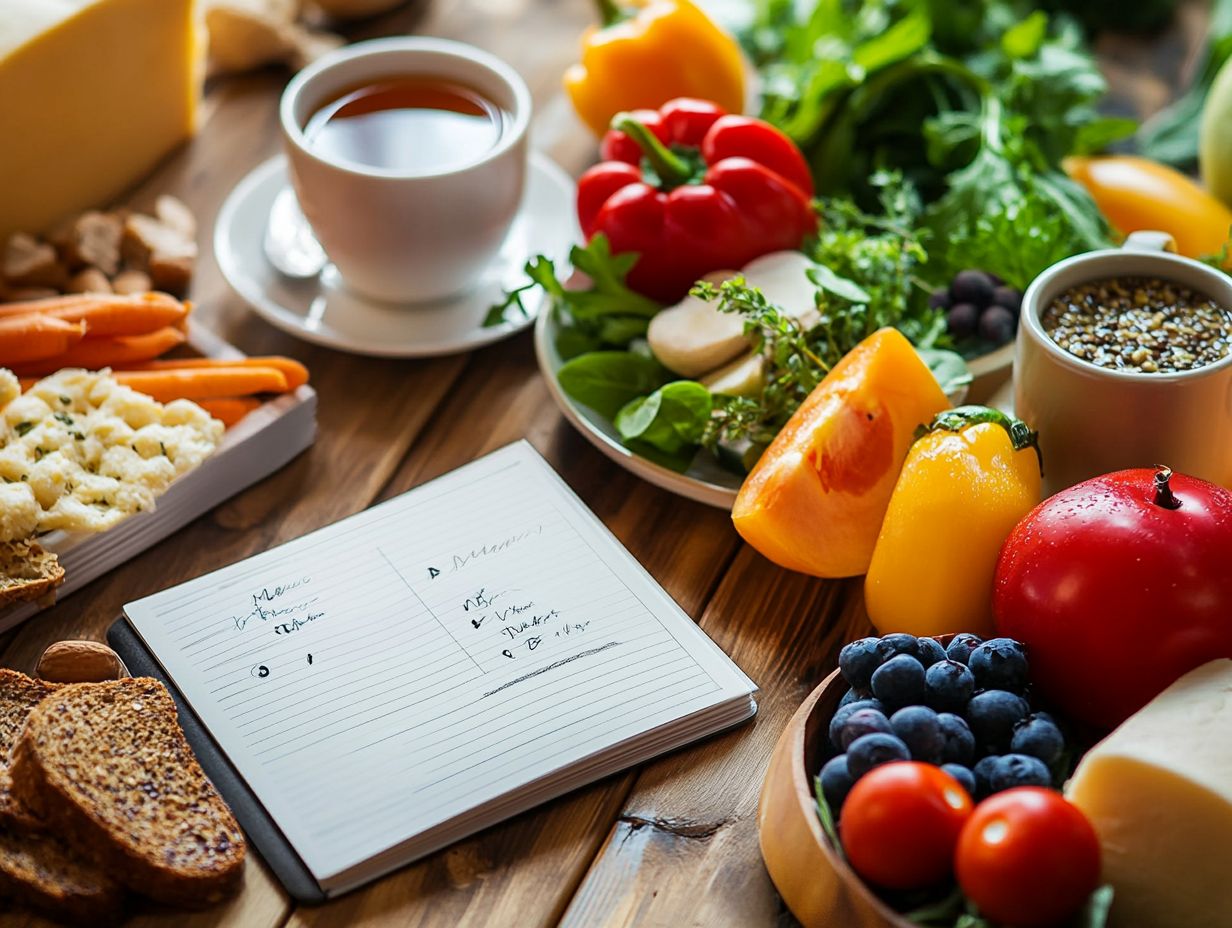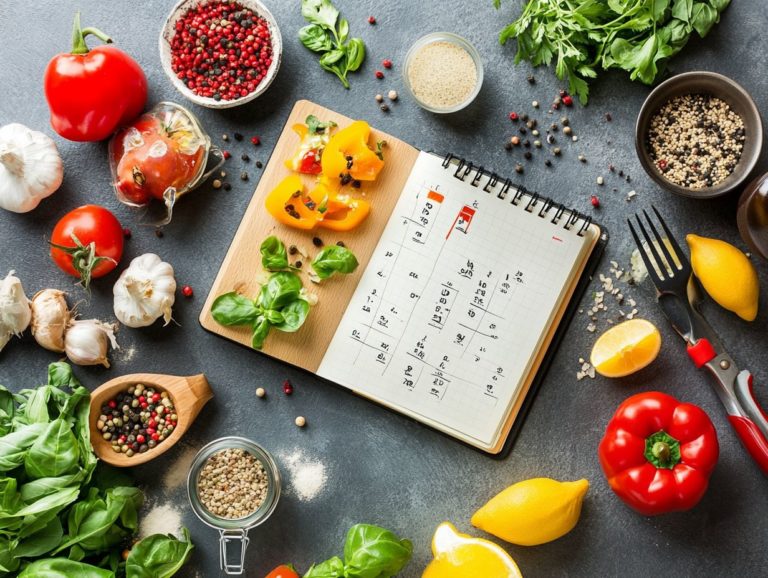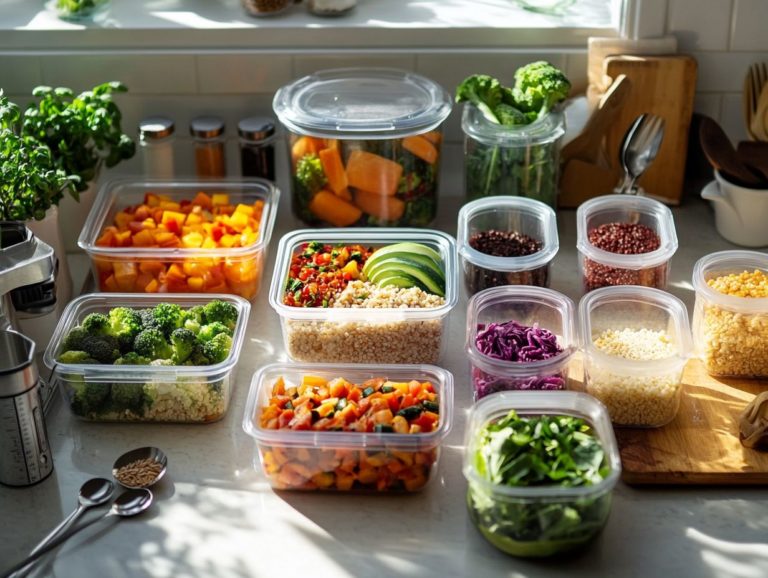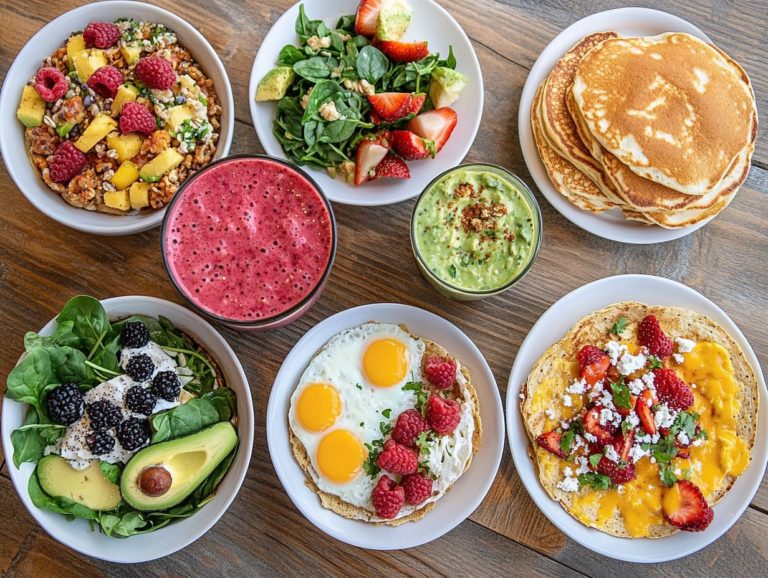How to Meal Plan for a Healthy Lifestyle
Meal planning transcends mere trendiness; it stands as a powerful ally in enhancing your lifestyle.
By organizing your meals, you can save both time and money while making healthier food choices. Let s explore the amazing benefits of meal planning!
You ll find practical tips that make meal prep fun and easy. Immerse yourself in this journey and discover how meal planning can elevate your eating habits to a whole new level!
Contents
- Key Takeaways:
- Why Meal Planning is a Game Changer!
- How to Build Your Perfect Meal Plan!
- Setting Goals and Priorities
- Choosing Nutrient-Rich Foods
- Tips for Successful Meal Planning
- Meal Planning for Special Dietary Needs
- Incorporating Variety and Balance
- Frequently Asked Questions
- What are the benefits of meal planning for a healthy lifestyle?
- How do I get started with meal planning for a healthy lifestyle?
- What should I include in my meal plan for a healthy lifestyle?
- How can I make meal planning more efficient?
- What are some healthy meal planning alternatives for busy schedules?
- How can I stick to my meal plan for a healthy lifestyle?
Key Takeaways:

- Meal planning saves time and money while providing important health benefits.
- To create a successful meal plan, set goals and choose nutrient-dense foods.
- Meal planning requires organization and flexibility, accommodating special dietary needs.
Why Meal Planning is a Game Changer!
Meal planning provides a wealth of benefits that elevate your overall wellness and streamline your kitchen efforts, making it an important habit for anyone striving to maintain a healthy lifestyle. To enhance this practice, learn how to plan meals for special diets.
By carefully organizing your weekly meals, you can optimize your grocery shopping, ensuring that you choose nutritious foods that promote clean eating. You ll effectively manage portion sizes and minimize food waste while encouraging the inclusion of fresh produce.
You can tailor your dietary needs with insights from a registered dietitian or through nutritional counseling, giving you the power to make informed choices that align with your health goals.
Time and Money Savings
Meal planning is a powerful strategy that can save you both time and money, revolutionizing the way you approach grocery shopping and meal preparation.
By meticulously organizing your meals for the week, you can streamline your grocery list, allowing for more efficient trips to the store. Using sales flyers helps you spot discounted items and encourages you to take advantage of loyalty programs that offer exclusive deals.
This thoughtful approach minimizes the temptation for impulse purchases. You ll only buy what you truly need, which ultimately reduces food waste. The time you save during meal prep allows for greater flexibility and enjoyment in the kitchen, making it easier to whip up wholesome, home-cooked meals without the stress of last-minute scrambles.
Health and Nutrition Benefits
Integrating meal planning for healthy eating on a budget into your routine can profoundly enhance your health and nutrition, perfectly aligning your diet with your unique dietary needs and preferences.
Make intentional choices. You can easily add fresh produce, whole grains, and healthy fats to your meals. Revamping your meal plan monthly allows you to select vibrant vegetables and fruits, ensuring that your meals are nutritious, visually appealing, and satisfying.
Whole grains, such as quinoa or brown rice, can replace processed options, providing you with essential nutrients and fiber. Including healthy fats from sources like avocados and nuts supports your overall well-being.
The expertise of registered dietitians is invaluable in this journey. They can craft meal plans that adhere to clean eating principles while offering personalized guidance through nutritional counseling, making healthy eating not just attainable but truly sustainable.
How to Build Your Perfect Meal Plan!
Crafting a meal plan demands careful thought about various factors, such as your dietary preferences, nutritional needs, and time availability. By understanding how to plan meals for weight loss, you can ensure you enjoy delicious and healthy meals each week that fit seamlessly into your lifestyle.
Start by evaluating your portion sizes and serving sizes. Choose recipes that resonate with your cooking skills and personal tastes. A thoughtful analysis of recipes can greatly enhance your meal prep efficiency, giving you the power to create a balanced and diverse menu that promotes clean eating and overall well-being.
Start meal planning today and enjoy a healthier lifestyle!
Setting Goals and Priorities

Setting clear goals and priorities in your meal planning process is essential for cultivating a healthy lifestyle tailored to your unique dietary needs, as outlined in the benefits of meal planning for health.
By dedicating time to establish personal objectives like increasing your vegetable intake, managing portion sizes, or creating a grocery budget you can craft a more personalized and effective meal plan.
For example, if you aim to include at least three servings of vegetables in each meal, you ll find yourself crafting vibrant, nutrient-rich dishes that elevate flavor and enhance your overall health.
Employing techniques like the SMART method Specific, Measurable, Achievable, Relevant, Time-bound can help refine these goals. By prioritizing meals that align with your objectives, you not only streamline decision-making but also spark excitement in exploring new recipes or planning themed dinners.
Choosing Nutrient-Rich Foods
Choosing nutrient-rich foods is your secret weapon for better health! By making informed choices, you elevate your well-being.
Incorporating a diverse array of food groups ensures you receive a broad spectrum of essential nutrients. Fresh produce, like vibrant fruits and vegetables, provides the vitamins and minerals necessary to boost your immune system. Whole grains are your go-to source of energy, offering fiber that aids digestion and enhances feelings of fullness.
Don t overlook healthy fats found in avocados and nuts; they are essential for brain health and hormone regulation. Legumes, bursting with protein and fiber, contribute to muscle repair and help maintain steady blood sugar levels.
When choosing these foods, opt for local and seasonal options to enjoy the freshest flavors while maximizing your nutrient intake.
Tips for Successful Meal Planning
Successful meal planning relies on your ability to execute effective meal prep for a healthy week and implement practical cooking tips. This approach transforms healthy eating into a seamless and effortless component of your daily routine.
Meal Prep and Storage Strategies
Effective meal prep and storage strategies are crucial for maximizing the benefits of your meal planning efforts. They give you fresh and convenient access to nutritious meals.
Implementing techniques like batch cooking, which means cooking large portions of food at once, can truly be a game changer. By preparing large quantities of grains, proteins, and vegetables at once, you can dedicate just a few hours each week to cooking, resulting in a variety of meals that only need reheating.
Portioning your meals into single-serving containers encourages proper serving sizes and streamlines your process on busy days when you’re racing against the clock.
Opting for high-quality storage containers helps keep your ingredients fresh longer, ensuring that nothing goes to waste. Grocery delivery services enhance your meal prep strategies by providing convenient access to fresh ingredients and healthy foods right at your doorstep. This makes it easier for you to stick to nutritious choices without the hassle of shopping trips.
How to Stay Motivated
Staying motivated in your meal planning and preparation journey is essential for maintaining a consistent, healthy lifestyle while genuinely enjoying the art of creating delicious meals. Recognizing the importance of meal planning for mental health can further enhance your experience.
Don t wait! Involve your family today in the cooking experience, transforming meal prep into a fun and collaborative activity. Experimenting with new recipes keeps your menu exciting and sparks enthusiasm around cooking.
Consider attending cooking classes to enhance your skills and introduce novel techniques, turning your kitchen into a dynamic space for culinary exploration.
Embracing these approaches cultivates a joyful atmosphere, transforming what could easily feel like a chore into a beloved ritual. This ensures that your journey toward healthy eating remains vibrant and inviting.
Meal Planning for Special Dietary Needs

Meal planning can be tailored to suit your unique dietary needs. By learning how to plan meals for a gluten-free diet, you can enjoy nutritious and satisfying meals even with specific restrictions or preferences.
Vegetarian, Vegan, and Gluten-Free Options
Incorporating vegetarian, vegan, and gluten-free options into your meal planning enhances your health and supports a sustainable food lifestyle.
These dietary approaches encourage a greater intake of fruits, vegetables, and whole grains. They help you maintain a balanced intake of nutrients. For example, enjoy a hearty lentil soup paired with a vibrant quinoa salad, both rich in protein and fiber. If you’re vegan, snack on hummus with crisp carrot sticks or a smoothie brimming with spinach, banana, and almond milk. If you’re gluten-free, savor a comforting bowl of brown rice topped with saut ed vegetables and grilled chicken.
To effectively plan meals that accommodate these preferences, create a diverse weekly menu. This should showcase various sources of protein, healthy fats, and essential vitamins. This way, everyone can enjoy a colorful and flavorful culinary experience.
Incorporating Variety and Balance
Incorporating variety and balance into your meal planning is vital for keeping your culinary experience exciting. It also ensures you receive all the essential nutrients for optimal health.
Embracing a diverse array of ingredients and flavors enhances your meals and supports your overall well-being.
Mixing Up Meals and Snacks
Mixing up meals and snacks keeps your diet fresh and enjoyable. It promotes healthy eating habits.
You ll love how simple it is to introduce a colorful array of fruits and vegetables, experiment with wholesome grains like quinoa or farro, and include lean protein sources such as grilled chicken or legumes. Embracing seasonal ingredients enhances flavor and boosts nutritional value. Plus, it makes your meals visually enticing.
Explore various herbs and spices to turn even a simple dish into a culinary adventure. Trying new flavors can become a delightful part of your routine.
With a touch of creativity in the kitchen, healthy eating transforms from a mundane task into a thrilling exploration.
Frequently Asked Questions
What are the benefits of meal planning for a healthy lifestyle?

Meal planning is your key to a balanced, nutritious diet today! It helps you save money on groceries and reduces food waste by only buying what you need.
How do I get started with meal planning for a healthy lifestyle?
Start by setting a goal for yourself, such as eating more vegetables or cooking at home more often. Then, create a meal plan for the week and make a grocery list based on that plan. To enhance your planning skills, check out this guide on how to use a meal planner effectively.
What should I include in my meal plan for a healthy lifestyle?
Your meal plan should include:
- A variety of fruits
- Vegetables
- Whole grains
- Lean proteins
- Healthy fats
Don’t forget to consider portion sizes and limit processed and high-sugar foods.
How can I make meal planning more efficient?
One way to save time is to cook in batches and use leftovers for future meals. Prep ingredients ahead of time and use a slow cooker or pressure cooker for quick meals.
What are some healthy meal planning alternatives for busy schedules?
If you have a busy schedule, consider meal delivery services or meal prep companies offering healthy and convenient options. Look for quick and easy recipes online or in cookbooks.
How can I stick to my meal plan for a healthy lifestyle?
To stay on track, follow a routine and make meal planning for a vegan lifestyle a habit. Keep healthy snacks on hand and be flexible if unexpected events arise. Always listen to your body and adjust as needed.
Get started on your meal planning journey now and enjoy delicious, healthy meals!






